BUENOS AIRES, ARGENTINA — Argentina’s new centrist, business-oriented government has appointed Daniel Meilan as its new Secretary of Mining. The geologist and former Secretary of Mines during the 1990s met with The Northern Miner’s Trish Saywell and special advisor to The Northern Miner in Argentina, Elena Mayer, at his office in Buenos Aires, to talk about his plans and expectations for the future with respect to mining in Argentina.
The Northern Miner: President Macri hopes to take Argentina in a new direction after 12 years of populist government under Cristina Fernandez de Kirchner and her husband Nestor Kirchner. You have a great deal to do to rebuild confidence in the mining sector.
Daniel Meilan: The first part of Nestor Kirchner’s government was a more capitalist one, but it gradually became more and more populist. It was a gradual process. Policies became more drastic: there were retentions, different exchange rates, no dividends were allowed abroad and all that economic craziness halted the mining industry. Argentina closed itself from outside, thinking it could stay away from the global economy and shut itself from the rest of the world.
It behaved like what we call “The Ostrich Policy.” This animal runs when it feels in danger, and when it finds out it can’t do anything to avoid being killed, it puts its head into the ground. It hides but it gets killed anyway. Argentina isolated itself and tried to keep a policy of internal consumption, which made us live in a unrealistic environment that did not end well. Now we have to come back to reality.
TNM: What is the reality?
DM: The political discussion here is whether Argentina requires surgery or whether it can just take a pill to get better. I believe we require surgery. Our new government has taken everything in a realistic way, and is trying to solve the problems quickly so that we can return to the international markets. Not to compete yet, but to get into the world again. To be at the global mining table again.
TNM: What are your priorities?
DM: To be competitive we have to lower inflation, maintain legislation, show that we can be trusted and work out the problems with the provinces that are against mining, and that’s the work I will be doing this year. We have time because prices in the international market are low. My objective this year is to cope with all these issues and start next year with confidence.
TNM: How do you think you can encourage the so-called “anti-mining” provinces to look at mining in a fresh light?
DM: The former government, instead of having a federal policy, had a unilateral one — when you work alone and you don’t reach consensus. Australia and Canada had similar problems and in different states and provinces they stopped the mining industry. The same happened to us because of poor public policies, because instead of working as a team with a common policy in a proper manner like we did with the World Bank, the central government left the provinces adrift, and there was no dialogue.
All this generated conflicts, which the federal government ignored. So these conflicts became bigger in a country without a mining culture, because we do not have big metalliferous national companies. Most Argentine non-metalliferous miners are small producers. So as mining is not the leading industry, and does not bring votes, governors started ignoring mining and supported the local people who are anti-mining.
On one hand you had conflicts and on the other you didn’t have support. In that way, provincial anti-mining policies and regulations that have no legal support [because we have a mining code which is above all this] were brought up.
What really matters is not only the legal issue, but to have a good relationship between the provinces and the mining industry. We met with all the provinces in the Consejo Federal Minero (COFEMIN) to discuss and try to revert this situation. All of them recognize that happened because the national government turned its back on the different situations. They didn’t defend mining when we needed their support.
TNM: Did any of the provinces become anti-mining because they didn’t think they received enough funds from the federal government and couldn’t see the benefits of the mining industry?
DM: In part it could be a financial problem, but it is mostly a community problem.
TNM: What do you mean by that?
DM: When we talk about community, we talk about the part of the society that is affected by the project. It is not only about money but also a problem of coexistence of the people living in the area and the industry.
TNM: Could you elaborate?
DM: There are two main branches: one is the environmental issue. The lack of knowledge and information that the people have about mining makes them believe that contamination is possible and sometimes it is difficult to give them an answer because of the silence and weakness of the government in responding to them in special cases when answers are requested. That makes anti-mining permeable to society.
TNM: Yes, and of course there was the spill at Barrick Gold’s Veladero project last fall, which probably didn’t help.
DM: Accidents in mining do happen. The important thing is to give an answer and prove that it was really an accident and that there is no contamination. This requires a serious government that can cope with it and fix the situation. Confidence must be earned, and like a plant you have to water it with truth every day, and with audits from the state, otherwise mining would be impossible.
TNM: How do you propose to do that?
DM: We propose collaboration between two organizations united by a mutual objective. One is the COFEMIN, the mining group composed of federal and now provincial representatives, of which I am part of. The other organization is the Consejo Federal de Medio Ambiente (COFEMA), which is the federal entity responsibe for protection of environment. It is like an orchestra. I’m the director and the owners of the resources [the provinces] are the musicians. If I guide them wrong, they play poorly, and if they don’t trust me they will not play well. We must all play together: me being a good director and them playing nicely.
TNM: We understand that Macri has established two ministries that are connected with mining.
DM: There are two ministries: the Energy and Mining Ministry where we are, and the Environmental Ministry, which is separate. Both are new and both will work together applying common federal policies in the provinces.
TNM: We have heard about a fund that will be set up to send more money to the provinces from the mining sector. Could you comment on this?
DM: We are analyzing instituting a Fondo de Responsabilidad Empresaria (Social Responsibility Trust Fund). It will be public and private because here the actors are public and private. After dropping the retentions [shortly after he was elected, Macri eliminated export duties of 5–10% on mining products], we are evaluating applying 1% on mining exports to this fund. That fund will work as an umbrella over each project. This will generate trust and confidence in the communities through the productive development and suppliers, services, contamination analysis, knowledge of the situation of the aquifers and auditing everything continuously. Above this we are instituting the Extractive Industries Transparency Initiative (EITI). It is the global transparency standard for improving governance of natural resources and money. Through the EITI we control the rational use of the national, provincial and county flow of money.
TNM: Was this your idea?
DM: Yes.
TNM: How will the system work exactly?
DM: It will be an external auditor. They are going to be involved in all the internal processes of the project and the external audit. No matter the jurisdiction of the project. The important thing is that there will be an external auditor and that will bring confidence to the people. The public money will not end in the politicians’ pockets. It avoids corruption.
TNM: Has this initiative been announced yet?
DM: No, I’m doing it now. I still have to reach consensus with the provinces.
TNM: So no one knows about this yet.
DM: When I spoke with the industry about retentions, I told them about this. Still it is not official.
TNM: Under Argentina’s 1993 Mining Investment Law, which has not been altered, companies have fiscal stability for 30 years, which seems quite competitive. Can you comment?
DM: Our legal framework is very competitive and that competitiveness, along with the macroeconomy, the macro politics and our natural resources, make a promising combination. If you take the growth/mature curve of mining, you will find Peru, Chile, Mexico and Brazil. Here in Argentina we are in our youth, together with Colombia and Ecuador, which gives us advantages for discoveries. And with the solid legal framework as we used to have in the 1990s, what we have to do is do things right and foster confidence in the world for investors to come back.
TNM: Yes, you definitely have a competitive mining code, but how can you rebuild trust amongst the foreign mining community in a country facing so many difficulties?
DM: Argentina is like a beautiful woman. She may have personality issues like moodiness, a strong personality or a tough character, but she is beautiful, so you have to take her as she is. We know our flaws, and we are trying to improve to become better. We are a beautiful country with a lot of resources, the only problem is that we aren’t mature. It is a cultural problem. We are immature, as is our mining. We are like the scorpion: we sting ourselves. I think that with time comes wisdom and improvement. That is why I am here because I sincerely believe we can build a reputation of a serious country and work hard in order to have a better country.
TNM: Do you think Argentina needs to make any changes to the mining code or introduce incentives to encourage foreign mining companies to invest here?
DM: No, the legal framework is good, the only thing we have to do is eliminate all the distortions or the extraneous regulations that were piled on top of it by the previous government. What the industry should do is engage in a dialogue and provide communities with a full spectrum of information about what mining is all about, so that they can make decisions. Communication is the number-one priority. Our strategy should be to prevent problems, not mitigate them. The environmental liabilities in Argentina have been small. We must look at the mature countries to learn from their mistakes and successes.
TNM: Exploration geologists here tell us that the government could make the process easier for mining companies by putting things like geological data and information on concessions (what has been staked already and what concessions remain open, etc.) online.
DM: I did that. I already left it prepared in 1999 before I left. The system was prepared for everybody from any part of the world to register and to have access to the mining properties but it was never implemented. It was part of the system in that moment not to show that because people didn’t want it. But now everything is ready and I promise to do it as fast as I can.
TNM: How soon do you expect to have it up and running?
DM: Before year-end.
TNM: Can you discuss energy costs?
DM: I’m in charge of mining and the Minister of Energy and Mines Juan Jose Aranguren is involved with energy issues. He knows he has two possibilities: one is conventional energy [i.e., dams and others]. If we don’t have energy we don’t have any chance of doing business. He is also working on non-conventional energies.
Today the reality is that the energy system is really poor. The minister is constantly deciding and communicating when the energy is going to be cut off, especially when the temperatures are high. We expect this problem will be solved progressively in the next two years to make the cost competitive. It is not competitive today.
TNM: How long do you think it will take before Argentina can make those costs competitive?
DM: Two years.
TNM: What about the permitting process? How long does it typically take to get a production permit?
DM: The problem is not the permit itself. With this brand-new government, you can get permits in a short time.
The main issue is the decision of the private companies and the situation of the international markets [economic and political cycles] … we have to improve efficiency at the national and provincial level and improve the competitiveness in energy and transportation infrastructure.
TNM: It was a good sign when Macri created the new Ministry of Mines and Energy, rather than keeping the responsibility for mining under or within the Ministry of Production. Do you anticipate a time when a Ministry of Mines is created, separate from the Ministry of Mines and Energy?
DM: When I was offered the position of Secretary of Mines, the ministry of mining was within the Ministry of Production. So I told my minister that it was better for me, since I was only a senior consultant who was giving political opinion. I had the chance to talk to Aranguren before he was the minister. I told him it was more reasonable for Argentina to have mining inside the Ministry of Energy, because we have much to do with the characteristics of oil and gas in regards to concessions and land access, and the relationship between the land and the landowner.
So it was much more logical to stay with the big brother than inside the Ministry of Production. We have to be modest. We already have the Ministry of Energy and Mines. We are known because of our cows, steaks and agriculture. We are a country with mining, not a mining country. That’s a big difference.
TNM: Is your objective to become a mining country?
DM: If we divide our country in two, we have on one hand agriculture and cattle raising, and on the other hand a small part that is mining. All the population and infrastructure is in this first big part. We have to give the possibility with mining to make it more balanced. If we accomplish this, the result would be to balance our country internally and grow the mining industry to bring foreign investment to our country … in the next 20 years we will realize whether Argentina is going to be a country that has mining or a mining country.
TNM: What percentage of the gross domestic product does mining make up now?
DM: One percent.
TNM: What would you like that number to be 20 years from now?
DM: We expect not as much as Chile or Peru, but 5% would be ideal.
TNM: You were the Secretary of Mines during the heyday of mining in Argentina during the 1990s. How does it feel to be back in the same position today?
DM: I never thought that after 15 years, I was going to be back in the same position.
TNM: How does it feel?
DM: I feel more experienced, calm and much more willing to take risks. Less scared — comfortable.
TNM: Some people we have talked to here seem to think you are a very good choice for this post.
DM: That’s because they know I’m open to dialogue. I don’t make unilateral decisions and I speak to everybody, and I keep my promises. The president lets me do my work and so does the minister of mines and energy.
TNM: Are you going to PDAC?
DM: Yes, but initially I didn’t plan to go because I was ashamed, in a way … every time Argentina went to Canada we were always treated nicely, and the last times we went, I felt embarrassed. So I thought it was better to come back the following year with all the plans and things I have to offer, because I didn’t want to be in the position of explaining what I am going to do. I wanted to say what I have done.
TNM: How would you describe Argentinians?
DM: People are nice, kind, warm, friendly, and they don’t make distinctions between people coming from different cultures. We are a little bit arrogant because of the French influence. It is a country of good people, but immature. That is our biggest problem.
TNM: Was it a hard decision to become Secretary of Mining again? When you were previously in charge of the file, it was in the golden years of mining in Argentina.
DM: That’s why it was so difficult for me to make the decision to come back. I left in the best moment so my question was: Why come back with all this mess? What I have ahead is a lot of work and much risk, so I talked to my wife and I said: ‘It is a challenge. People believe in me, they are on my side and I cannot let them down.’

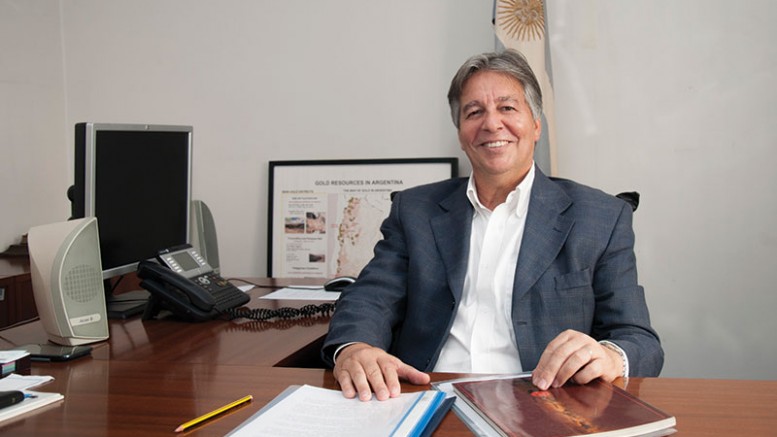
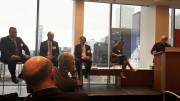
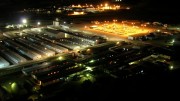
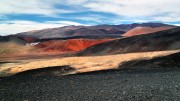
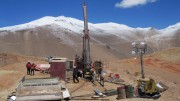
Be the first to comment on "Argentina strives to make up for lost time, mines secretary says"